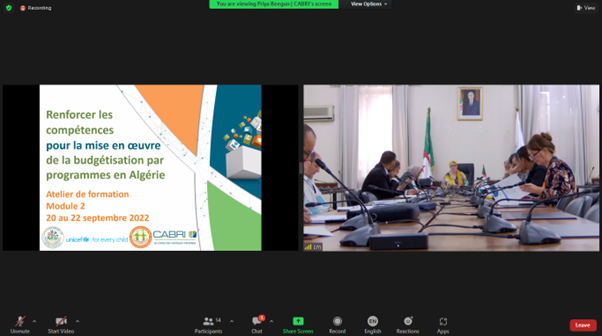
Following the signature of the partnership in June between CABRI and UNICEF Algeria to support the National Economic, Social, Environmental Council (CNESE) and the National Body for the Promotion and Protection of Childhood (ONPPE), CABRI designed seven training modules on the various steps of programme-based budgeting (PBB) and the design of a satellite account for childhood sectors. This training programme falls within the ongoing public finance reform in Algeria framed by the organic law of finance laws adopted in 2018 to enter into force in 2023 and the draft of a National Plan for Action (NPA) for children in partnership with the permanent commission of childhood placed under the authority of ONPPE. The “Childhood satellite account” will facilitate the analysis of economic and budgetary data in the framework of the national accounting system and national social and economic accounts.
Drawing on CABRI’s 20 years’ experience and lessons in public financial management, building public finance capabilities and knowledge generation in PBB reforms, the modules were designed with the objective of improving the understanding, credibility and performance of budgets in childhood sectors and of measuring and monitoring allocations and national expenditures for children. Approximatively, forty members of the childhood commission and budget officers in the 16 Ministries of the commission as well as representatives of the budget office at the Ministry of finance were enrolled to participate in the training programme.
Module 1 on Understanding PBB concepts and tools took place in July 2022 for three days during which the following sessions were held: (i) link between PBB and public financial management (PFM) as well as key lessons learned in PFM reforms; (ii) key definitions of PBB concepts; and (iii) enabling environment and sequencing of PBB reform.
The experiences of Tunisia and South Africa were presented in case studies highlighting the processes, challenges and iterations that are still underway for the implementation of PBB. Finally, the participants undertook a practical assignment that entailed presenting the favorable environment put in place and the progress that remains to be made for the effective implementation of PBB in Algeria.
Module 2 on the Preparation of PBB took place in September 2022 for three days and aimed at equipping participants to (i) design and prepare a programme-based budget; (ii) develop medium-term expenditure estimates for PBB and economic classification; and (iii) achieve value for money. The Tunisian, South African and WAEMU countries’ experiences were shared all through the sessions. The participants got to practice formulating a program, activities and defining performance indicators for an institution of their choice in the childhood commission.
Besides the training programme, CABRI has developed on an online platform resource to enhance knowledge with key operational documents from several African countries and further reflections from participants all through the program.
Both modules were met with success as the majority of the participants confirmed that they learned new concepts as well as countries’ experiences and felt more aware of the strategic approach to implementing PBB.
Modules 3 to 7 will take place in the next six months.